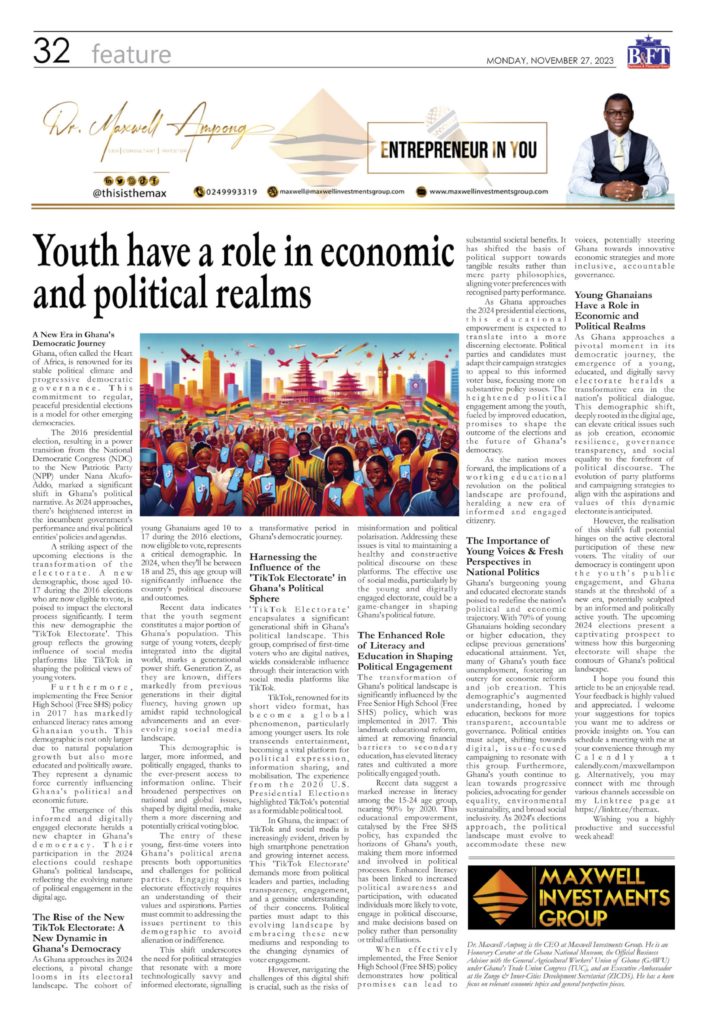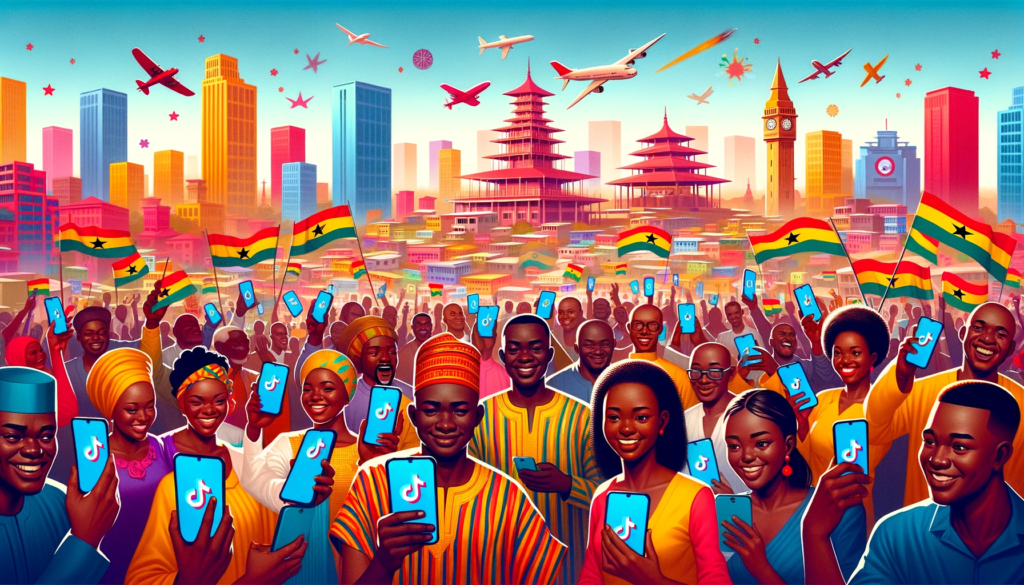
A New Era in Ghana’s Democratic Journey
Ghana, often called the Heart of Africa, is renowned for its stable political climate and progressive democratic governance. This commitment to regular, peaceful presidential elections is a model for other emerging democracies.
The 2016 presidential election, resulting in a power transition from the National Democratic Congress (NDC) to the New Patriotic Party (NPP) under Nana Akufo-Addo, marked a significant shift in Ghana’s political narrative. As 2024 approaches, there’s heightened interest in the incumbent government’s performance and rival political entities’ policies and agendas.
A striking aspect of the upcoming elections is the transformation of the electorate. A new demographic, those aged 10-17 during the 2016 elections who are now eligible to vote, is poised to impact the electoral process significantly. I term this new demographic the ‘TikTok Electorate’. This group reflects the growing influence of social media platforms like TikTok in shaping the political views of young voters.
Furthermore, implementing the Free Senior High School (Free SHS) policy in 2017 has markedly enhanced literacy rates among Ghanaian youth. This demographic is not only larger due to natural population growth but also more educated and politically aware. They represent a dynamic force currently influencing Ghana’s political and economic future.
The emergence of this informed and digitally engaged electorate heralds a new chapter in Ghana’s democracy. Their participation in the 2024 elections could reshape Ghana’s political landscape, reflecting the evolving nature of political engagement in the digital age.
The Rise of the New TikTok Electorate: A New Dynamic in Ghana’s Democracy
As Ghana approaches its 2024 elections, a pivotal change looms in its electoral landscape. The cohort of young Ghanaians aged 10 to 17 during the 2016 elections, now eligible to vote, represents a critical demographic. In 2024, when they’ll be between 18 and 25, this age group will significantly influence the country’s political discourse and outcomes.
Recent data indicates that the youth segment constitutes a major portion of Ghana’s population. This surge of young voters, deeply integrated into the digital world, marks a generational power shift. Generation Z, as they are known, differs markedly from previous generations in their digital fluency, having grown up amidst rapid technological advancements and an ever-evolving social media landscape.
This demographic is larger, more informed, and politically engaged, thanks to the ever-present access to information online. Their broadened perspectives on national and global issues, shaped by digital media, make them a more discerning and potentially critical voting bloc.
The entry of these young, first-time voters into Ghana’s political arena presents both opportunities and challenges for political parties. Engaging this electorate effectively requires an understanding of their values and aspirations. Parties must commit to addressing the issues pertinent to this demographic to avoid alienation or indifference.
This shift underscores the need for political strategies that resonate with a more technologically savvy and informed electorate, signalling a transformative period in Ghana’s democratic journey.
Harnessing the Influence of the ‘TikTok Electorate’ in Ghana’s Political Sphere
‘TikTok Electorate’ encapsulates a significant generational shift in Ghana’s political landscape. This group, comprised of first-time voters who are digital natives, wields considerable influence through their interaction with social media platforms like TikTok.
TikTok, renowned for its short video format, has become a global phenomenon, particularly among younger users. Its role transcends entertainment, becoming a vital platform for political expression, information sharing, and mobilisation. The experience from the 2020 U.S. Presidential Elections highlighted TikTok’s potential as a formidable political tool.
In Ghana, the impact of TikTok and social media is increasingly evident, driven by high smartphone penetration and growing internet access. This ‘TikTok Electorate’ demands more from political leaders and parties, including transparency, engagement, and a genuine understanding of their concerns. Political parties must adapt to this evolving landscape by embracing these new mediums and responding to the changing dynamics of voter engagement.
However, navigating the challenges of this digital shift is crucial, such as the risks of misinformation and political polarisation. Addressing these issues is vital to maintaining a healthy and constructive political discourse on these platforms. The effective use of social media, particularly by the young and digitally engaged electorate, could be a game-changer in shaping Ghana’s political future.
The Enhanced Role of Literacy and Education in Shaping Political Engagement
The transformation of Ghana’s political landscape is significantly influenced by the Free Senior High School (Free SHS) policy, which was implemented in 2017. This landmark educational reform, aimed at removing financial barriers to secondary education, has elevated literacy rates and cultivated a more politically engaged youth.
Recent data suggest a marked increase in literacy among the 15-24 age group, nearing 90% by 2020. This educational empowerment, catalysed by the Free SHS policy, has expanded the horizons of Ghana’s youth, making them more informed and involved in political processes. Enhanced literacy has been linked to increased political awareness and participation, with educated individuals more likely to vote, engage in political discourse, and make decisions based on policy rather than personality or tribal affiliations.
When effectively implemented, the Free Senior High School (Free SHS) policy demonstrates how political promises can lead to substantial societal benefits. It has shifted the basis of political support towards tangible results rather than mere party philosophies, aligning voter preferences with recognised party performance.
As Ghana approaches the 2024 presidential elections, this educational empowerment is expected to translate into a more discerning electorate. Political parties and candidates must adapt their campaign strategies to appeal to this informed voter base, focusing more on substantive policy issues. The heightened political engagement among the youth, fuelled by improved education, promises to shape the outcome of the elections and the future of Ghana’s democracy.
As the nation moves forward, the implications of a working educational revolution on the political landscape are profound, heralding a new era of informed and engaged citizenry.
The Importance of Young Voices & Fresh Perspectives in National Politics
Ghana’s burgeoning young and educated electorate stands poised to redefine the nation’s political and economic trajectory. With 70% of young Ghanaians holding secondary or higher education, they eclipse previous generations’ educational attainment. Yet, many of Ghana’s youth face unemployment, fostering an outcry for economic reform and job creation. This demographic’s augmented understanding, honed by education, beckons for more transparent, accountable governance. Political entities must adapt, shifting towards digital, issue-focused campaigning to resonate with this group. Furthermore, Ghana’s youth continue to lean towards progressive policies, advocating for gender equality, environmental sustainability, and broad social inclusivity. As 2024’s elections approach, the political landscape must evolve to accommodate these new voices, potentially steering Ghana towards innovative economic strategies and more inclusive, accountable governance.
Young Ghanaians Have a Role in Economic and Political Realms
As Ghana approaches a pivotal moment in its democratic journey, the emergence of a young, educated, and digitally savvy electorate heralds a transformative era in the nation’s political dialogue. This demographic shift, deeply rooted in the digital age, can elevate critical issues such as job creation, economic resilience, governance transparency, and social equality to the forefront of political discourse. The evolution of party platforms and campaigning strategies to align with the aspirations and values of this dynamic electorate is anticipated.
However, the realisation of this shift’s full potential hinges on the active electoral participation of these new voters. The vitality of our democracy is contingent upon the youth’s public engagement, and Ghana stands at the threshold of a new era, potentially sculpted by an informed and politically active youth. The upcoming 2024 elections present a captivating prospect to witness how this burgeoning electorate will shape the contours of Ghana’s political landscape.
I hope you found this article insightful and enjoyable. Subscribe to the ‘Entrepreneur In You’ newsletter here: https://lnkd.in/d-hgCVPy.
I wish you a highly productive and successful week ahead!
♕ —- ♕ —- ♕ —- ♕ —- ♕
Disclaimer: The views, thoughts, and opinions expressed in this article are solely those of the author, Dr. Maxwell Ampong, and do not necessarily reflect the official policy, position, or beliefs of Maxwell Investments Group or any of its affiliates. Any references to policy or regulation reflect the author’s interpretation and are not intended to represent the formal stance of Maxwell Investments Group. This content is provided for informational purposes only and does not constitute legal, financial, or investment advice. Readers should seek independent advice before making any decisions based on this material. Maxwell Investments Group assumes no responsibility or liability for any errors or omissions in the content or for any actions taken based on the information provided.


